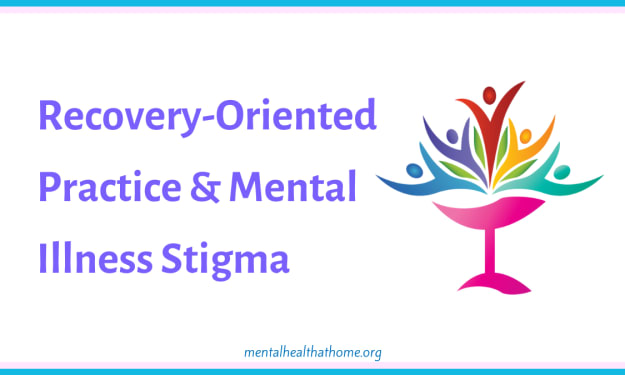Is There Really a "Post-Abortion Syndrome"?
The Relationship Between Abortion and Mental Health

Reversing Roe is a documentary recently released on Netflix that looks at the attempts that have been made over the years to challenge the United States Supreme Court's decision on abortion in the Roe v. Wade case. It mentioned something referred to as "post-abortion syndrome," a spectrum of adverse mental health effects that occur following an abortion. As a mental health professional myself, I knew that this isn't a diagnosis in the current Diagnostic and Statistical Manual (DSM-5), but I was curious to know more. While I support a woman's right to choose what happens with her own body, my focus here is not whether abortion is wrong or wrong, but rather whether post-abortion syndrome has been established as a legitimate phenomenon. I will use the term abortion to refer specifically to induced abortions rather than spontaneous abortions (i.e. miscarriages).
Post-abortion syndrome is not something that has been accepted in the literature of the mainstream medical community, and it is not listed as a diagnosis in the DSM-5 or in the the World Health Organization's International Classification of Diseases (ICD-11). Rather, it is a term that seems to be generally put forth by anti-abortion activists. Our mainstream diagnostic systems are far from perfect, but if a new diagnosis is going to be argued for it should have a solid footing in scientific research evidence rather than arguments citing pseudoscience.
There are multiple major medical and mental health organizations that have concluded based on findings from rigorous scientific studies that there is no evidence that abortion is associated with a greater risk of mental health problems. These organizations include the American Psychological Association, the U.K. Royal College of Psychiatrists, the U.K. Royal College of Obstetricians and Gynaecologists, and the U.K. National Collaborating Centre for Mental Health.
After reviewing the best available evidence, the National Collaborating Centre for Mental Health concluded that:
- Women with unwanted pregnancies had the same rates of mental health problems whether they had an abortion or gave birth.
- Unwanted pregnancy in and of itself was a risk factor for mental health problems, and this risk increased if the woman had a history of mental health problems.
- Certain external factors may be associated with risk of mental health problems post-abortion, including pressure from a partner to have an abortion, negative attitudes toward abortions, and negative personal experience of the abortion.
The Royal College of Obstetricians and Gynaecologists clinical guideline for induced abortion states that the "great majority" of women who have an abortion don't experience mental health problems later on; however, some women may be at increased risk due to a past history of mental health problems, other negative live events, or a negative reaction to the abortion.
The American Psychological Association (APA) Task Force on Mental Health and Abortion reviewed the relevant research literature and found that most of the studies had considerable methodological problems that limited the conclusions that could be drawn from their findings. Based on the best scientific evidence available, they concluded that:
- "Among adult women who have an unplanned pregnancy the relative risk of mental health problems is no greater if they have a single elective first-trimester abortion than if they deliver that pregnancy."
- The evidence regarding multiple abortions was more equivocal, which may be influenced by various co-occurring risks associated with both multiple unwanted pregnancies and mental health issues.
- Women who had a late-term abortion due to fetal abnormality had an increased risk of negative mental health consequences, but this risk was still less than women who delivered an infant with life-threatening defects.
The APA task force identified several factors that increased the risk of negative psychological responses post-abortion, noting that many of these same factors predict negative psychological reactions in any type of stressful life event:
- perceived stigma
- perceived need for secrecy
- poor social support regarding the abortion
- personality factors including low self-esteem and reliance on avoidance and denial as coping strategy
- thoughts about the pregnancy, including how much the woman wanted and felt committed to it
- past history of mental health problems (the single strongest predictor across studies of post-abortion mental health outcomes)
A systematic review of the literature by Charles et al. concluded that high quality studies suggested that abortion did not increase the risk of mental health problems, while the studies with poor scientific design, and therefore less reliable conclusions, were more likely to find negative mental health consequences associated with abortion.
Some American states have attempted to impose restrictions around abortion within the confines of the Roe v. Wade decision, whether or not those restrictions are supported by medical evidence. For example, South Dakota requires that a women having an abortion must sign an informed consent with her physician that includes a description of depression and suicide as risks associated with abortion. According to a report by the Guttmacher Institute, seven other states also require that the informed consent process describes negative emotional responses to abortion: Kansas, Louisiana, Michigan, Nebraska, North Carolina, Texas, and West Virginia.
Kelly (2014) writes about post-abortion syndrome (PAS) as a "social diagnosis" in which "social claims and gender stereotypes outweighed scientific research that directly contradicted its existence." She argues that gender stereotypes and the enforcement of traditional gender roles play a significant role in arguments for PAS. She also points out that organizations claiming to help women who are purported to have PAS recommend Christian lay counselling rather than evidence-based standard treatment for PTSD. She states:
"The gender essentialist worldviews of PAS advocates lead them to advocate for paternalistic abortion policies that claim to ‘protect’ women from their own decisions. Thus, the certainty demonstrated by activists, PAS researchers, and policy makers in PAS claims-making stems not from scientific or reliable evidence, but from moral and religious fervor."
The Catholic Church expresses its views in a report by the Pontifical Academy for Life. As expected the the report comes from an anti-abortion perspective, but from a purely academic perspective it's a weak paper, and the average reader is likely to have difficulty separating out generally agreed upon fact from pseudo-medical talk. The report describes post-abortion syndrome as a type of post-traumatic stress disorder, and offers diagnostic criteria despite the fact that it's not recognized in any medical diagnostic system. Interestingly, there is a footnote giving the number of Google search results for the term "post-abortion syndrome", as though a large number of Google hits is in and of itself useful in establishing the validity of proposed medical diagnoses. Clinical experience is presented as being on par with research evidence. There is a statement that 62% of participants in a study became suicidal as a result of their abortions. I was curious to read this study, but the statement is not properly referenced so it was impossible to look up the original study for verification.
Regardless of one's beliefs about abortion, if post-abortion syndrome is going to be put forward as a medical phenomenon, it needs to be backed by strong scientific evidence just like any other medical diagnosis. At this point in time, the science does not appear to support the existence of such a diagnosis. Medical diagnostic systems are not static and accepted diagnoses may change as new evidence becomes available, but for now we are better off trusting to the current state of the evidence rather than accepting arguments that use pseudo-science to back moral positions.
Sources
American Psychological Association. (2008). Report of the APA Task Force On Mental Health and Abortion.
Charles, V.E. et al. (2008). Abortion and long-term mental health outcomes: A systematic review of the evidence. Contraception, 78(6), 436-450.
Guttmacher Institute. (2018). Counselling and waiting periods for abortion. https://www.guttmacher.org/state-policy/explore/counseling-and-waiting-periods-abortion
Kelly, K. (2014). The spread of 'Post Abortion Syndrome' as social diagnosis. Social Science & Medicine, 102(2014), 18-25.
Lazzarini, Z. (2008). South Dakota's abortion script–threatening the physician-patient relationship. The New England Journal of Medicine, 359(1), 2189-2191.
National Collaborating Centre for Mental Health. (2011). Induced Abortion and Mental Health: A Systematic Review of the Mental Health Outcomes of Induced Abortions, Including Their Prevalence and Associated Factors.
Pontifical Academy for Life. (2014). Post-abortion trauma: Possible psychological and existential aftermaths.
Royal College of Obstetricians and Gynaecologists. (2011). The Care of Women Requesting Induced Abortion: Evidence-Based Clinical Guideline.
About the Creator
Ashley L. Peterson
Mental health blogger | Former MH nurse | Living with depression | Author of 4 books: A Brief History of Stigma, Managing the Depression Puzzle, Making Sense of Psychiatric Diagnosis, and Psych Meds Made Simple | Proud stigma warrior






Comments
There are no comments for this story
Be the first to respond and start the conversation.